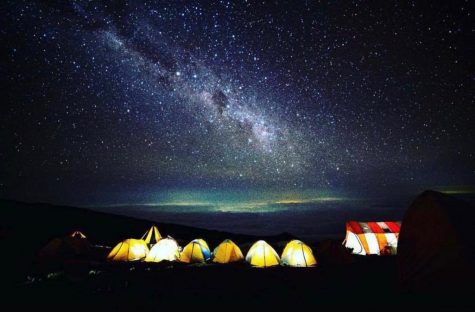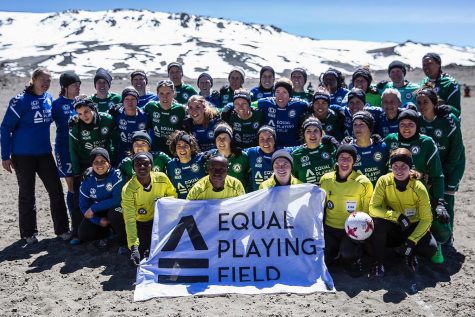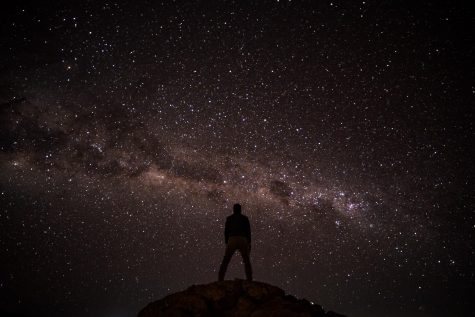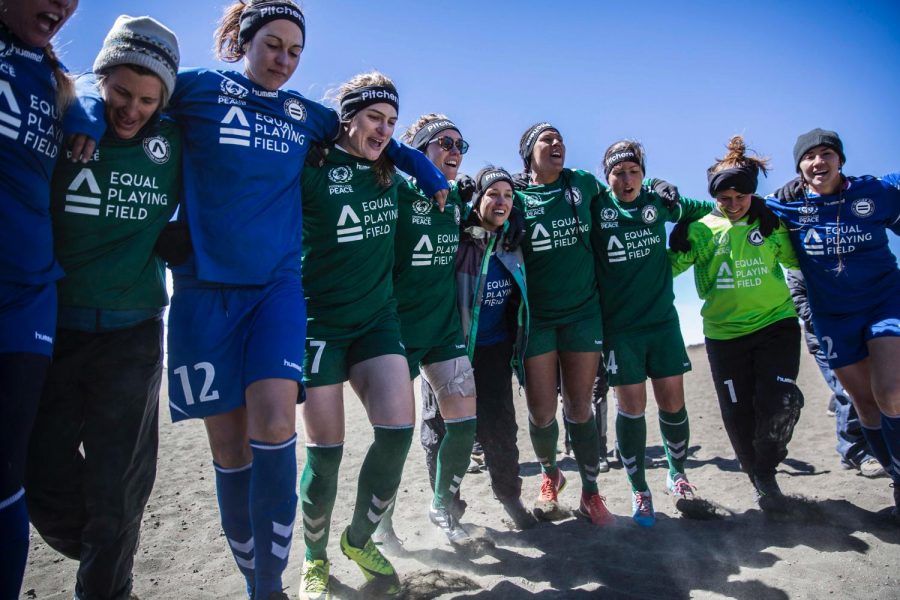Kim Smith, second from left, celebrates with the entire group of players and coaches after the record setting match. Smith coached Volcano FC in the highest altitude soccer game ever. Image courtesy of Smith.
Kim Smith participates in record setting soccer game, fights for female equality
October 8, 2017
Known as the “Beautiful Game,” soccer is by far the most popular sport on earth.
Fans only need a ball and their feet to play, but disparity in the game persists. Headlines about soccer stars cover the pages of newspapers from Japan to Uruguay to Poland — but almost all coverage revolves around the men’s side of the game, ignoring the female half.
This inequity prompted Erin Blankenship and Laura Youngson to establish Equal Playing Field, an organization seeking opportunity, equality and respect for women in sports. The organization broke records this summer playing the highest altitude soccer game ever atop Mount Kilimanjaro in Tanzania. Archer’s varsity soccer coach and Upper School Coordinator Kim Smith participated in the record-setting game.
“The playing field is not equal. Women’s sport remains under-represented, under-supported and undervalued,” the organization’s website said. “In many cultures, women are forbidden from playing sport at all. We are committed to challenging these norms and we are going to start by breaking a World Record…This project is one step along the way to equality in sport, our way of pushing for equal representation and respect on the pitch and in life.”
Smith heard about the proposed summit of Mount Kilimanjaro from a former soccer teammate and was immediately on board.

“What better way to create awareness [for women’s sports] than set a world record,” Smith said. “The timing of it was perfect.”
In recent years the conversation around inequity in sports, but specifically soccer, has heightened. Players speaking out about disparity in turf conditions and pay differences has shed light on persisting injustices facing female athletes.
“The goal of the game was to finish the game,” Smith said. “By climbing our own physical mountains, we inspire girls and women to climb their own mountains — visible or not.”
Mount Kilimanjro was specifically selected at the location because it is one of the world’s highest peaks, but also has a flat enough surface to play a regulation game.
“We had [players from] 20 different countries, six continents. We had people from Rwanda, France, Germany, Saudi Arabia — in their country [women] aren’t even allowed to be spectators at sporting events,” Smith said. “Here in the U.S., I played soccer in college and professionally; it was just understood that’s the way it was. This experience opened my eyes to the inequality I faced.”
Notable players who participated in the record-setting game included Petra Landers, a member of Germany’s first women’s World Cup Team, and Lori Lindsey, an American two-time champion.
Traveling up Mount Kilimanjaro
The trek up the mountain itself took seven days and took an immense toll on the players’ bodies.
“I’m not a hiker; I’m not a camper, so I was uncomfortable the entire trip. It was all new to me,” Smith said. “Every day was new. I had never experienced such expansive beauty, but it was the hardest thing I have done in my entire life. It challenged me on a physical, mental and spiritual level.”
The participants were split into two teams: Volcano FC, which Smith coached, and Glacier FC.
Prior to the match, the women participated in a practice kick-about at an elevation of 4,200 meters (13,779 feet). Smith’s team, Volcano FC, won 1-0.
But the journey was nowhere near done. The players continued to hike into even higher elevations until June 24, the day of the world record match. The team camped beneath the game site and rose early to travel to the site of the pitch.
“They did a great job acclimating us to the altitude, but the hardest day — for me and everyone — was game day. We woke up at 2 a.m. and had to climb this vertical path 1,000 meters (3,280 feet). It was 14 degrees, and all I had was a headlamp,” Smith said. “I looked up and saw a line of lights. I turned to my buddy and said, ‘Oh my gosh, those are the stars.’ She said, ‘No, those are headlamps’ — I realized how much farther we all had to go. It was one of those moments where you reach a wall where you think you can’t do it, you can’t push past it — but I was able to summon the strength of those around me to be able to push past that. I went from ‘I can’t’ to ‘I can do anything.’”
But the day was long from done. After reaching the game site, the pitch had to be assembled, all fitting strict FIFA regulations. Goals were carried from the mountain’s based and the field itself was lined in flour, so they did not harm the environment.
The elevation was 5,729 meters (18,796 feet) — seven times taller than the world’s tallest building. According to Smith, FIFA banned games over 125 meters (8,202 feet), and the altitude certainly had an effect.

“As a coach, I like to survey the field to get into the zone. I walked across the field, and I was done. It was hard to imagine that [the players] had to run around for 40 minutes,” Smith said. “[During the game] a couple players had to come off to get oxygen, but the majority of my team played a full 90 minutes.”
Medical staff were on hand and helped athletes to ensure they stayed healthy during the game.
The game ended in a 0-0 draw, but the record had been set.
“When you work hard for something and experience those uphills, being able to push through that and get to the finish line is just such a feeling of accomplishment,” Smith said. “In hindsight, a lot of us were in shock that it actually happened. Coming back home [I] realized the enormity of it.”
The team capped off their celebration by summiting Mount Kilimanjaro.
“There’s great satisfaction and euphoria in being able to achieve [the world record],” Smith said. “I definitely had Archer in mind and with me on the trip.”
Continued Efforts
Although the record-setting trip has been completed, Equal Playing Field’s efforts and Smith’s own work continue.

There is a documentary on the trip which has promoted the organization’s efforts and fueled continued change. It was screened at Archer last month. FIFA, TED and other major news outlets are all documenting the journey too and working to further spread awareness.
“It’s getting out there,” Smith said. “People are watching the documentary and hopefully it will inspire them to challenge inequality that they experience in their own environments.”
Smith plans to attend an upcoming march to the Dead Sea with Equal Playing Field to continue the fight for women’s equality in sports.
“[The game] definitely motivated me to continue to be involved in Equal Playing Field and to take on further challenges,” Smith said. “These challenges are going to continue to happen until one day [equality] won’t be a conversation. It will be, ‘You’re a girl? You can play any sport you want.’

